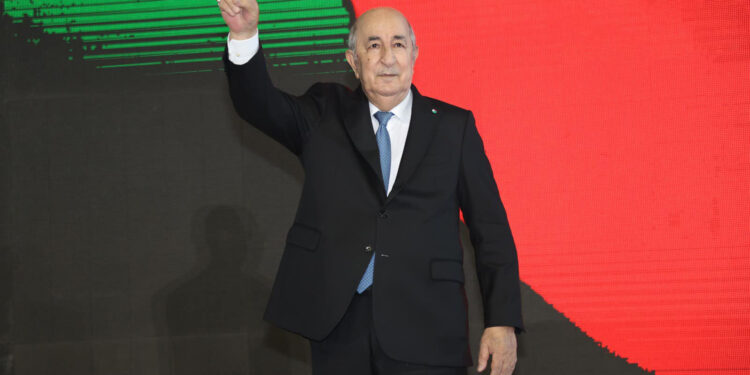The programs of the three candidates for the Algerian presidential elections scheduled for September 7th adopted promises that included economic and living aspects that concern the Algerian citizen, with the aim of attracting the largest number of voters in the most important event witnessed by the country.
The economic aspect received more space in the speeches of the competitors, starting with introducing developmental reforms to the country’s economic and institutional system, and reaching the dedication of efforts to place Algeria among the countries with strong economies according to the aspirations of the citizens.
The competitors tried -during 20-day election campaign – promotion For their programs, through popular gatherings andMedia interventions and social media.
The candidates entered a three-day electoral silence period, during which they or their representatives are prohibited from engaging in any electoral activity until the day the voting process begins to choose a president of the republic to lead Algeria for the next five years.
Diversified economy
The candidate of the Socialist Forces Front, Youssef Ouchich, said that he will work to establish the foundations of a diversified national economy, capable of creating wealth that will protect Algeria from external shocks and dependence on hydrocarbons (oil and gas sector revenues).
Through his “Vision” program, Ouchich pledged to establish a national agency for food security, increase the volume of exports, improve the business climate, and create integrated economic poles to contribute to the advancement of the local economy, while enabling citizens to contribute to development.
He promised to encourage important investments in the renaissance of the agricultural, farming and tourism sectors. He also pledged to develop the industrial sector, especially with regard to manufacturing industries, building heavy industry and establishing 4 major markets to market agricultural products.
Completing the reforms
For his part, independent candidate Abdelmadjid Tebboune, through his electoral program “For a Victorious Algeria”, pledged to continue achievements and reforms, complete the construction of a new Algeria, and establish a modern state that meets the aspirations of citizens, pledging to support purchasing power and combat unemployment.
Tebboune, who is running for a second presidential term, promised to boost local production, continue to increase wages, raise the value of the dinar, work to maintain the growth rate at 4%, and launch 20,000 investment projects.
Tebboune stressed that food security is not a slogan, pledging to provide support to farmers so that they do not import “a single gram” of durum wheat, barley, and corn, and to achieve self-sufficiency, in addition to ending the import of sugar and oil by 2027.
He said that he would work to raise the country’s national income to reach $400 billion by 2027, while providing 450,000 jobs for young people if he is elected for a second term.
economic freedom
The candidate of the Movement of Society for Peace for the presidential elections, Abdelali Hassani Cherif, pledged to preserve the social character of the local economy, freedom of investment and earnings, freedom of trade and economic management.
Hassani also pledged to make the Algerian economy capable of ensuring equal economic opportunities between investors and traders.
The pledges of the “Forsa” program of candidate Hassani are based on reviewing the investment and tax laws in a way that reduces the tax burdens on investors, in addition to reviewing the banking system in Algeria.
He also promised to renew the currency, reduce unemployment and inflation rates, control prices and regulate the exchange market to ensure the stability of the dinar.
The MSP candidate pledged to develop the border areas as they are linked to the country’s national security, in addition to encouraging agriculture, grain cultivation, and the production of basic materials such as milk.
social welfare
Economic expert Murad Koshi says that the people or the voting class in Algeria are no longer interested in political slogans as much as they are interested in economic progress and advancement and the social welfare it brings, and this is what the candidates for the Algerian presidential elections have realized.
Speaking to Al Jazeera Net, Kawashi confirmed that the voters’ programmes focused on the economic aspect by offering solutions and promises to improve the standard of living of citizens in order to attract the largest number of them.
Koshi considered that some of the candidates’ promises seem unrealistic, such as raising the gross domestic product to more than $450 billion, reducing the inflation rate to 3%, and increasing the volume of exports by $30 billion within 5 years.
Koshi returned to promises to raise social grants to improve citizens’ standard of living through large increases in wages and unemployment benefits, saying that this would lead to higher inflation rates.
For his part, economic expert Ahmed Al-Haidousi believes that the three candidates aim – through their programs – to raise the capabilities of the Algerian economy and improve the living conditions of citizens.
He said in an interview with Al Jazeera Net that there is a candidate who has a progressive leftist approach that seeks to revive the public industrial fabric, while another sees the need to establish a free solidarity economy dominated by the private sector, and the third wants to combine the public and private sectors.
The economic expert pointed out that there is agreement between the candidates on a number of issues, such as adopting a new division of the Algerian states according to a new economic vision that takes into account the resources of each region, unlike the previous division.



